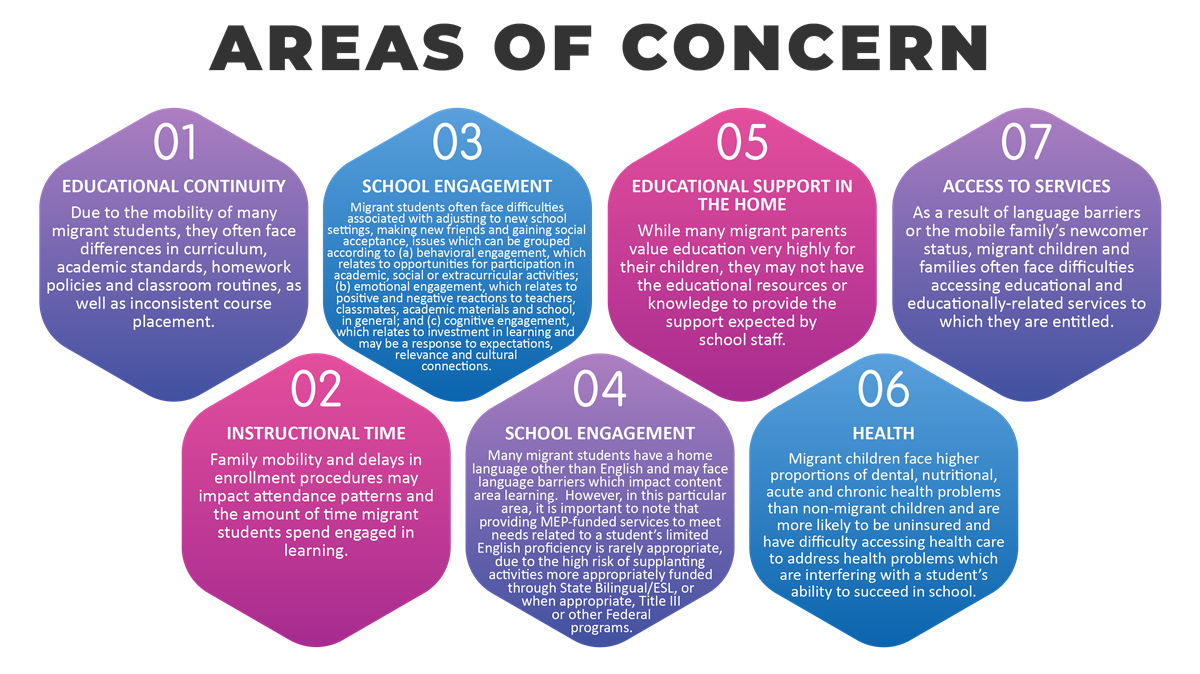Migrant Education
Migrant Education Program
Identification and Recruitment
- Recruiters help migrant students obtain education assistance they need
- Migrant students have more resources available to help lessen the negative educational consequences associated with migration
- Recruiters have the opportunity to connect migrant children to the greatest number of educational services.
- WHO
- Is the child under the age of 22?
- Is the child lacking a U.S. issued high school diploma or equivalency certificate?
- Is the child, or does the child have a parent, guardian or a spouse who is, a migratory agricultural worker or migratory fisher?
- WHAT
- What is the qualifying temporary employment or seasonal employment in agriculture or fishing?
- WHERE
-
- Did the family move due to economic necessity from one school district to another?
-
- WHY
- Was one of the purposes of the move to seek or obtain qualifying work?
- WHEN
-
- Did the child move on his/her own or move to accompany, or join a parent, spouse or guardian, within the preceding 36 months?
-
If the answer to all of these questions is "Yes," then a qualifying move has been made and the child(ren) is (are) eligible for recruitment into the MEP.
Out of School Youth
- Be under the age of 22
- Changed school districts in the last 36 months
- The youth or one or both parents must hold some type of agricultural work that may include plant farms, fisheries, poultry farms, dairies, cattle ranches, and field work picking vegetables and/or fruits.
Let us help you!
Required Forms
2024-2025 Forms
- 2024-2025 Family_Survey_English
- 2024-2025 Family_Survey_Spanish
- 2024-2025_ID_and_R_Action_Plan_Template
- 2024-2025_Migrant_Student_Late_Enroll_Early_Withdraw
- 2024-2025_Needs_Assessment_Action_Plan
- 2024-25_Priority_For_Service_Action_Plan_Template
- Priority_For_Service_Evaluation_Form
- PFS_Student_Progress_Review_Form
Archived Forms
- Priority_For_Service_Student_Progress_Review
- Priority_For_Service_Evaluation_Form
- 2022-23_Family_Survey
- 2022-23_Family_Survey_Spanish
- 2022-2023_ID_and_R_Action_Plan_Template
- 2022-2023_Migrant_Student_Late_Enroll_Early_Withdraw
- 2022-2023_Needs_Assessment_Action_Plan
- 2022-23_Priority_For_Service_Action_Plan_Template
- 2023-24_Family_Survey
- 2023-24_Family_Survey_Spanish
- 2023-2024_ID_and_R_Action_Plan_Template
- 2023-2024_Migrant_Student_Late_Enroll_Early_Withdraw
- 2023-2024_Needs_Assessment_Action_Plan
- 2023-24_Priority_For_Service_Action_Plan_Template
Needs Assessment
- Goal 1: Reading
- Goal 2: Mathematics
- Goal3: School Readiness
- Goal 4: High School Graduation/Out-Of-School Youth (OSY)

Areas of Concern

Resources
TEA Federal Program Compliance Division
Federal Resources for Educational Excellence sponsored by the U.S. Department of Education reports on effective educational programs, practices, and products. For example, information is available about reading, mathematics, middle school curriculum, dropout prevention, early childhood education, and English learners. For more information, visit https://www2.ed.gov/parents/landing.jhtml
The Handbook for Educators Working with Children of Mexican Origin can be found at http://people.uncw.edu/martinezm/Handbook/html/index.htm
Colorín Colorado, a nationally recognized bilingual site for families and educators of English learners, is found at http://www.colorincolorado.org/
The National Association for the Education of Young Children is dedicated to improving the well-being of all young children, with a focus on the quality of educational and developmental services for all children from birth through age 8 http://www.naeyc.org
The National Association of State Directors of Migrant Education (NASDME) offers its annual National Migrant Education Conference held in the spring. At this event, staff learn strategies in curriculum and instruction, parent involvement, assessment, identification and recruitment, and program administration. For more information, see https://www.nasdme.org/
The National Center for Families Learning offers information and materials on migrant family literacy. http://www.familieslearning.org/
Teaching English to Speakers of Other Languages offers everyone involved in English language teaching and learning an opportunity to be part of a dynamic community, where professionals connect with and inspire each other to achieve the highest standards of excellence. http://tesol.org/
The National Center for Farmworker Health (NCFH) is a private, not-for-profit corporation headquartered in Texas that is dedicated to improving the health status of farmworker families by providing information services, training and technical assistance, and a variety of products to community and migrant health centers nationwide, as well as organizations, universities, researchers, and individuals involved in farmworker health. http://www.ncfh.org/
The iSOSY MEP Consortium supports the delivery of services to migrant OSY. http://osymigrant.org
Requirements by Universities for undocumented students to enroll in college


